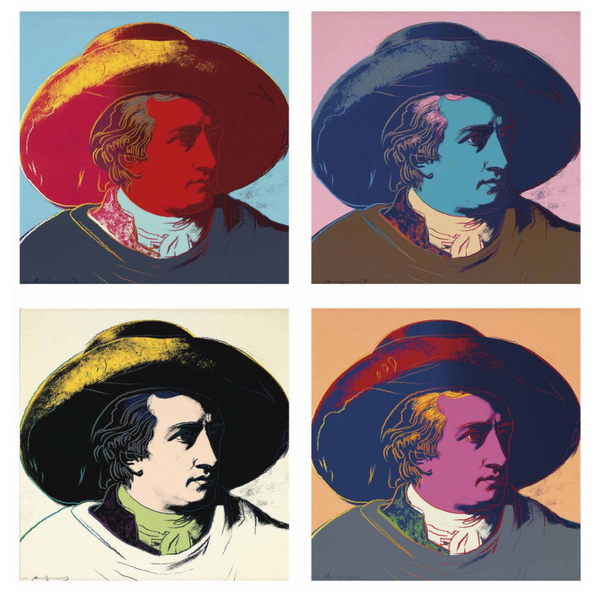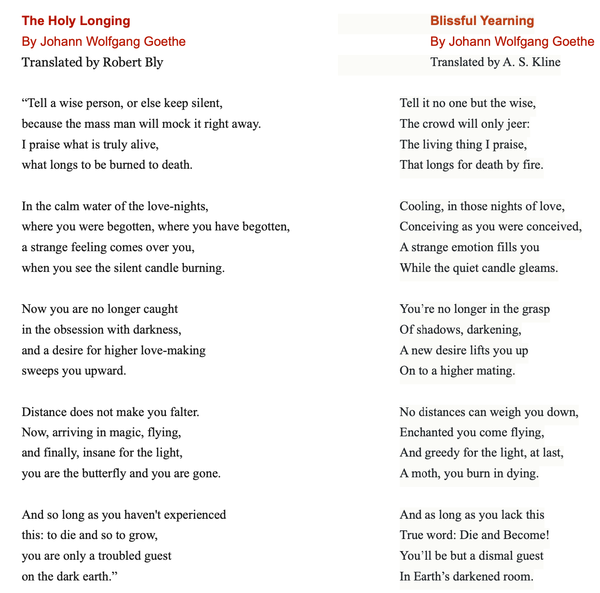Today, Friday (August 28) is Johann Wolfgang von Goethe’s birthday (1749-1832). The poet/scientist is the source of many of my beloved quotes. Here are the two at the top of my list:
“Human life runs it course in the metamorphosis between receiving and giving.”
“Die and Become.”
Goethe’s language was German, late 18th Century/early 19th Century German. My version of his meaning has been translated into our modern English by AS Kline, British poet and mathematician. I translate it into my own soul language which differs every day.
I’ve had spiritual fun writing this post on Beloved Quotes and the Mystery of Translation. I hope you smile with wonder as you read this and reflect on your own Beloved Quotes and Translations.
There is so much value in looking at translation especially today with the turbulent world we are living in. What are the quotes that you translate into feelings of safety? integrity? comfort? etc. We all have our own language and, sadly, many of us are incapable or unwilling to translate. There is no universal language or universal meaning so we need to all practice the mysterious art of translation with openness.
At the end of the post I share two very different translations of Goethe’s poem where he says “Die and Become.” They will wake you up to the mystery of translation.
My work as a spiritual friend is work of constant translation. I must always be translating in my listening and speaking the languages of my client’s body, biography, longings, challenges and hopes.
There are many quotes I admire as they fill me with awe, but certain quotes are tattooed on my soul. I call them my beloved quotes. They make my heart sing. They illuminate my thinking. They put me on solid ground. I love the verb “to quicken” which means to stimulate or restore to life. My beloved quotes quicken my soul every time I think about them.
Why do I almost instantly connect certain quotes to memory? Why do they become almost magical companions, always soothing comforters, or great teachers to my life or reconnect me to divine purpose?
I also am aware that knowing the name of the author of the beloved quote is important. It humanizes the quote and makes it more precious. Yet, this relationship doesn’t require that I read everything this author ever wrote. It was just a week ago that I read the entire poem that contains “Die and Become” but this quote has been beloved and active in my soul for at least 30 years. It is like the karmic relationship of the brief encounter when you have a momentary interaction with an individual that changes your life yet you know nothing of their life.
Before I continue, take a few moments and think of your beloved quotes. Write a couple down on a piece of paper. Feel the light, the warmth, the tone and the force of meaning in each and how it swells your soul with life.
I don’t know that I ever thought about the experience of a beloved quote until now. Why do I so resonate with a particular quote. A mystery. Maybe it is because they change me, inspire my way of knowing myself, my times, my worldview. They are not just memorable, beloved quotes are livable. I want to live them.
I will take a beloved quote apart and contemplate every word, even rewrite it. I am translating every word and meaning into my own world of soul.
Have you ever thought about translation? When we translate we carry meaning from one language to another. I love “Goethe in Four Colors” image as it reminds how differently we can color/translate not just our perceptions but also our own thoughts, feelings and intentions.
“Die and Become!” Is a line in a poem by Goethe. I wanted to find that poem. (God bless, search engines!). I found two different translations, which I share with you below. They brought up the challenge of translation and meaning.
In his translation, Robert Bly translates “Die and Become” as “Die and Grow.” “Grow” does not sing to me they way “Become” does. Grow seems to be about plants and childhood. Become is much more mature in its demand. Become holds the possibility of unlimited new consciousness. Grow seems to require measurement. This is my response. You may find “grow” more inspiring.
Exercise: Compare both translations in regard to meaning, flow, rhythm and sound and discover which word or phrase feels best to you. Wake up your senses of hearing, movement, word and meaning. And don’t hesitate to rewrite the poem. Create your own translation.
“Die and Become” may not become one of your beloved quotes because of this exercise, but the purpose of the exercise is to wake up and empower your attention to translated meanings. Living in every word or phrase are many meanings. Our souls are always translating not just what we love, but also what we doubt, fear or hate.
|
|



